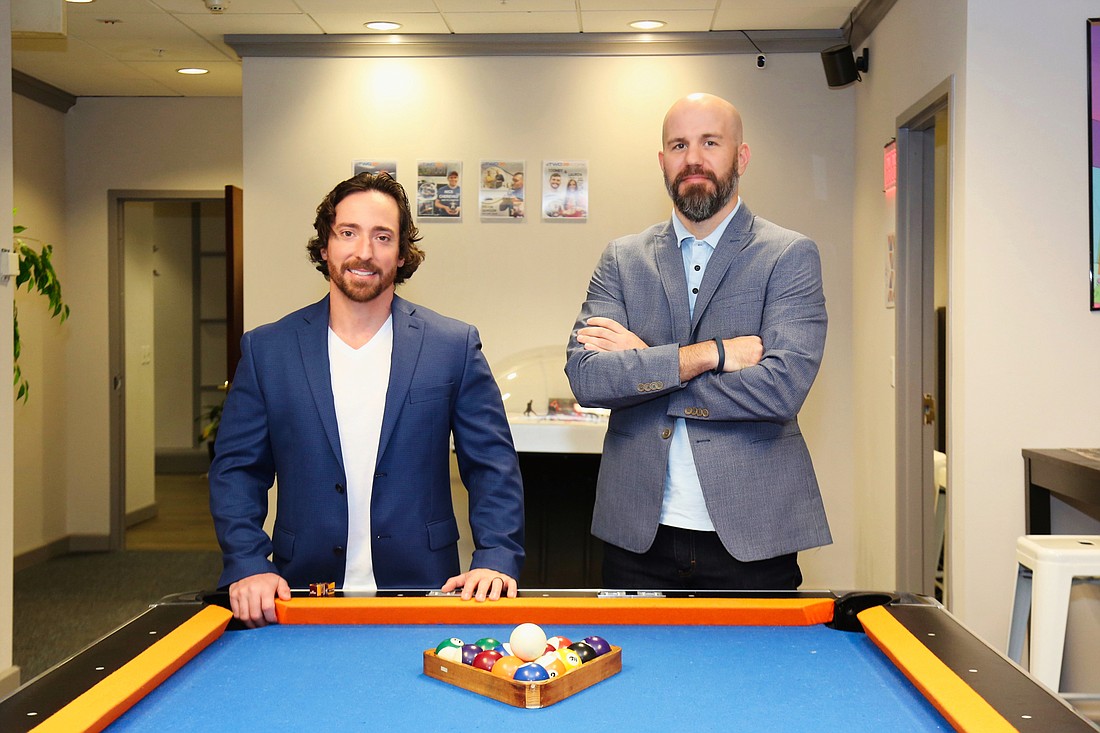- April 2, 2025
-
-
Loading

After his wife had a frustrating day shopping for jeans, Dave Desmarais thought there had to be a better way.
“She was going to different stores, and nothing was fitting,” Desmarais says. “When she got home, she said flippantly, ‘Why can’t anything fit like these pants I have on right now?’ And that sparked the idea for our company and technology.”
That business, Naples-based Tailored, uses an artificial intelligence platform it created called Capture to measure garments using a smartphone photo. “The idea was if you have clothes that you think fit well, and you wanted to find something new, you would snap a photo of the garment, and our technology would measure it and be able to find something at a different or the same brand that fits the same based on size comparison,” says Desmarais, the co-founder and CEO.
‘Without capital, we can’t go fast, which is what we need to be able to do.' Dave Desmarais, Tailored
It’s early days at the company officially started in 2017, so those kinds of capabilities remain longer-term. But Tailored is already gaining traction in the resale space and sees big potential in e-commerce and even behind the scenes for clothing manufacturers. “Our system is still very young,” says Desmarais, 38.
Resale has been a good first entry point that’s helping the company further develop its AI system. It has three current customers in that space: resale listing technology company Thrift Collective, Jacksonville online consignment/thrift store Eco Quality Clothing and Los Angeles–based Circular Fashion LA, which restores, resells and upcycles pre-owned clothing.
“Resale is like this booming industry because none of their processes are automated,” Desmarais says. “Our Capture system is able to help streamline the process. Instead of taking someone listing a garment online eight to 10 minutes with all the info they have to plug in, we can drop it down to two minutes or less using our technology.”
Here’s how it works: Snap a photo of a garment using a smartphone, and Capture’s AI platform can provide accurate measurements to within 1/8 of an inch. This information then provides buyers and sellers valuable sizing information for online shopping, which can help reduce customer dissatisfaction, returns and waste. “A lot of times returned items don’t get resold [by the original retailer]; they go to off-price retailers or the landfill,” Desmarais says.
Tailored’s 2020 revenues grew by 150% over 2019, Desmarais says, and the company’s organic inbound leads are up 10 times over this same time last year. It’s getting inquiries from places like the U.K. and Germany and from major companies including Nike, PVH Corp., Tommy Hilfiger and Farfetch.
It admittedly took a lot of trial and error to get to this point. “If we knew now what we didn’t know then …,” Desmarais says. “We must have wasted tens of thousands of dollars on different companies that would build things halfway for us. It was super frustrating for the first year or more, but eventually, we started to make progress.”
A machine-learning expert and a systems engineer, both based in Atlanta, teamed up to build Tailored the AI platform it wanted. And the company’s founders believe their lack of experience in the tech world — Desmarais previously worked in finance and retail, and co-Founder and COO Jeff Collins has a background in sales — works to their advantage.
“Sometimes I feel like technicians build what they want to build, not necessarily what the customer wants or needs,” says Collins, 45. “What we try to do is flesh out what the customer actually needs and wants, so we can build it.”
The business has been primarily self-funded to this point, with some family investment. Tailored recently won a $5,000 prize at the first Startup Pitch Event put on by Southwest Florida accelerator program TWO39 Labs and recently launched the process of raising outside capital. It’ll target angel groups and seed funds to raise money to allow it to add to its current staff of six and build up its data set, so it can work with bigger clients. “Without capital, we can’t go fast, which is what we need to be able to do,” Desmarais says.
In 2021, Tailored will be focused on continuing to build its footprint in the resale space and expanding into e-commerce. Pilots done for companies like Stitch Fix, Levi’s and Threadup have helped show the potential once its AI technology gets more robust. The Stitch Fix trial, for example, found 91% of customers liked the idea of using their existing wardrobe to help Stitch Fix learn their size, and 87% would continue taking photos of their existing clothing if it meant receiving better-fitting items.
In 2022 and beyond, Tailored envisions adding in-house services for big retailers, such a quality assurance and minute measuring tasks during the manufacturing process. “There are a lot of things we need to do to get with these billion-dollar companies,” Desmarais says. “But I see Tailored as being intertwined in the entire supply chain.”